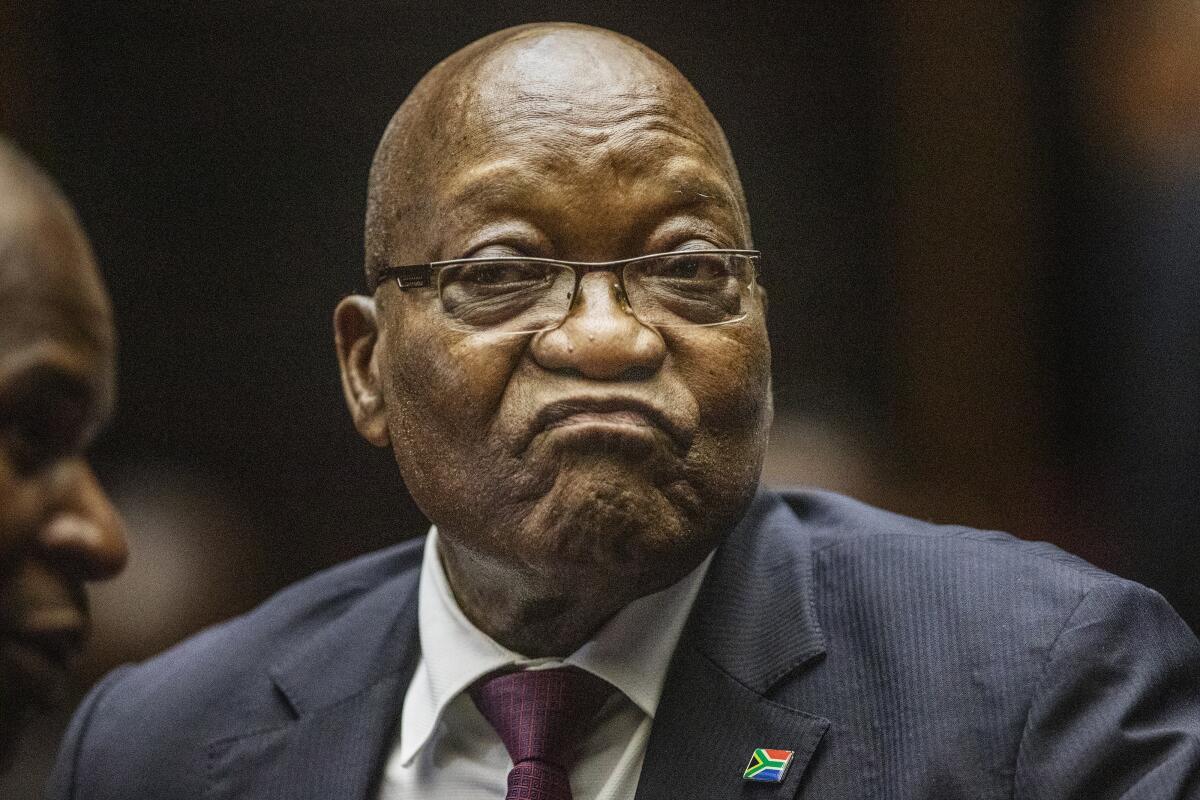Arrest warrant issued for former South African leader Jacob Zuma

- Share via
JOHANNESBURG, South Africa — A judge in South Africa issued an arrest warrant Tuesday for former President Jacob Zuma for failing to appear in court on a corruption case that he has sought to avoid for months — now by asserting that he is ill.
The National Prosecuting Authority requested the warrant, the South African Broadcasting Corp. reported. It does not take effect until the case resumes on May 6.
Reports have said Zuma is in Cuba seeking treatment for a health issue. The NPA requested Zuma’s medical records as evidence of his claim, the state broadcaster reported.
State advocate Billy Downer told the Pietermaritzburg High Court that Zuma’s team has said he will be out of the country for treatment until mid-March, local media reported. Zuma’s legal team said he had two operations in early January before going abroad. But the judge questioned a letter from a military hospital explaining Zuma’s absence, noting it was not dated.
Zuma’s lawyer Daniel Mantsha told the state broadcaster that issuing an arrest warrant was a bad move. “That is sending a wrong message that our courts have no sympathy, no compassion, and that is not something that should be celebrated,” he said.
Zuma’s medical team, including the military and doctors abroad, will determine his fitness to appear before the court in May, Mantsha said.
It was not clear when the former president would return from Cuba. According to South Africa’s justice ministry, the two countries have negotiated but not signed an extradition agreement.
The 77-year-old Zuma, whose past court appearances have been marked by defiant speeches and by supporters singing and dancing, has faded into the background as his legal challenges to the corruption charges have faltered.
A court late last year dismissed Zuma’s attempt to appeal a ruling that cleared the way for him to be prosecuted. He is accused of receiving bribes from French arms manufacturer Thales through his former financial advisor Schabir Shaik, who was convicted of fraud and corruption in 2005.
Zuma denies charges of corruption, money laundering and racketeering related to the controversial 1999 arms deal when he was deputy president. He has alleged his case was prejudiced by lengthy delays in bringing the matter to trial. He also has alleged political interference.
The charges were thrown out by prosecutors nearly a decade ago in a contentious decision that opened the way for Zuma to become president. Prosecutors returned to the case after his rocky presidency.
Zuma, who took office in 2009, resigned in 2018 under pressure from the ruling African National Congress after widespread public outcry over allegations of mismanagement and corruption that severely affected state-owned companies.
The corruption is estimated to have cost South Africa billions of dollars.
South Africa and its economy, the most developed in sub-Saharan Africa, have continued to struggle to recover under Zuma’s successor, President Cyril Ramaphosa, who has apologized for the past mismanagement and vowed reforms that some critics have said are long in coming.
The scandals sparked outrage and have badly hurt the reputation of the ANC, which has ruled South Africa since the end of the harsh system of white minority rule known as apartheid in 1994.
The scandals also severely hurt investor confidence.
More to Read
Sign up for Essential California
The most important California stories and recommendations in your inbox every morning.
You may occasionally receive promotional content from the Los Angeles Times.










